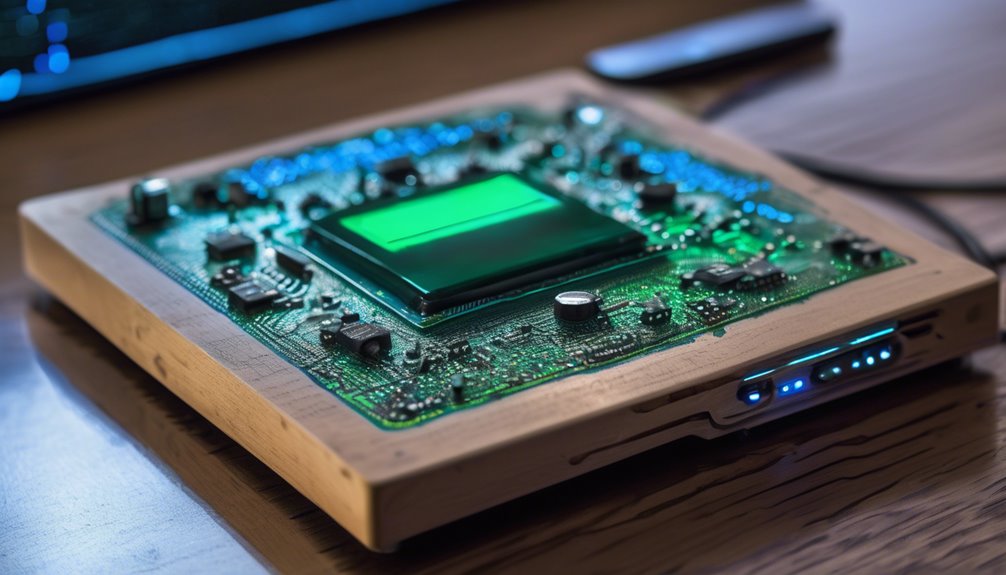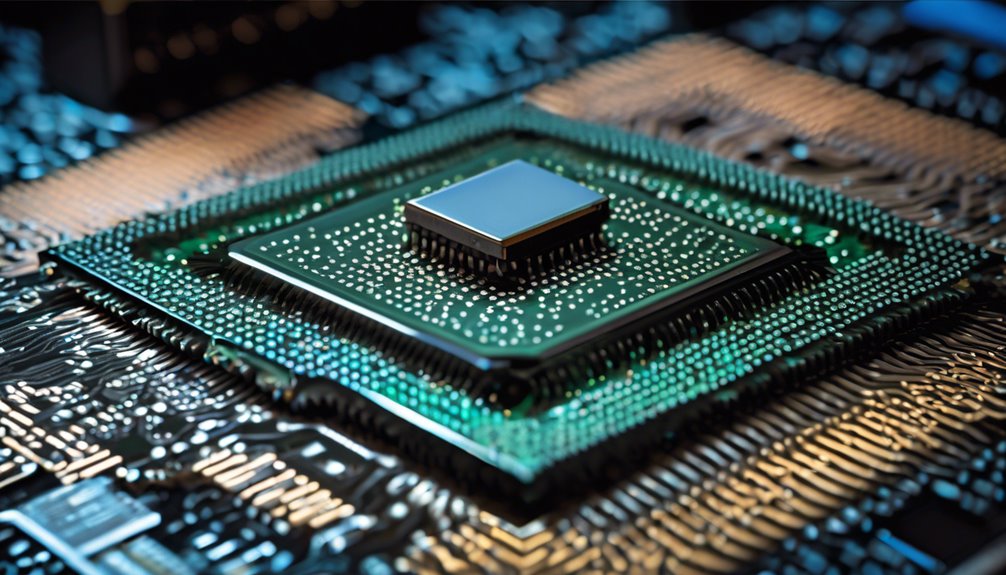If you're looking to understand the role of a Data Processing Unit, or DPU, in modern computing, you're in the right place. DPUs are more than just another piece of hardware; they play a crucial role in optimizing data-centric tasks. By offloading specific functions from the CPU, they can significantly enhance performance. But how exactly do they compare to CPUs and GPUs? Let's explore their unique features and applications.
What Is a DPU?

A DPU, or Data Processing Unit, is a specialized hardware component designed to accelerate data-centric workloads.
You'll find that these units play a crucial role in modern computing by offloading specific tasks from the CPU, enabling faster and more efficient data processing.
When managing complex data streams, a DPU helps optimize performance by handling tasks such as data storage management, network processing, and security functions.
This allows your CPU to focus on higher-level computations, improving overall system efficiency.
As you work with increasingly large datasets, a DPU can significantly enhance your productivity, making it an essential tool for data centers and cloud computing environments.
Key Features of DPUs
DPUs bring several key features that enhance data processing capabilities. First, they specialize in offloading data-centric tasks, freeing up your CPU for more critical computations. You'll notice improved efficiency as DPUs handle data movement and processing with optimized architectures.
Another feature is their ability to execute complex algorithms directly on the data, minimizing latency and speeding up analytics. They also support parallel processing, allowing multiple data streams to be handled simultaneously, which accelerates workloads in cloud environments.
Additionally, DPUs often integrate security features, ensuring your data remains protected during processing. With these capabilities, you can expect enhanced performance and scalability for your applications, ultimately driving better data-driven decision-making in your organization.
How DPUS Differ From CPUS

While both DPUs and CPUs are essential for computing, they serve distinct purposes that significantly impact performance.
CPUs, or Central Processing Units, handle general-purpose tasks and execute a wide range of applications. They're designed for versatility and speed in processing instructions.
In contrast, DPUs, or Data Processing Units, specialize in managing data-centric tasks, such as data storage, security, and network functions. This specialization allows DPUs to offload specific workloads from the CPU, enhancing overall system efficiency.
By freeing up CPU resources, DPUs can accelerate data handling, especially in environments that require real-time processing.
How DPUS Differ From GPUS
Although both DPUs and GPUs play crucial roles in modern computing, their functions are tailored to different tasks.
DPUs, or data processing units, focus on managing data workloads, optimizing data movement, and offloading tasks from the CPU. They excel at handling data-intensive applications, such as security and data management.
On the other hand, GPUs, or graphics processing units, are designed primarily for rendering graphics and performing parallel computations. They shine in gaming, video editing, and machine learning tasks.
While both units enhance performance, DPUs prioritize data efficiency, freeing up CPU resources, whereas GPUs emphasize visual processing and computational power.
Understanding these distinctions helps you choose the right technology for your specific needs.
Use Cases for DPUs

As businesses increasingly rely on data-driven decision-making, the use cases for data processing units (DPUs) become more apparent.
You can leverage DPUs for tasks like network management, security, and storage optimization. For instance, they excel at offloading network processing from CPUs, freeing up resources for other critical applications.
In cybersecurity, DPUs can analyze traffic patterns in real-time, detecting anomalies and potential threats more efficiently.
Additionally, in data centers, they optimize storage by managing data flows, reducing latency, and improving overall performance.
By integrating DPUs into your infrastructure, you can enhance application performance and scalability, leading to more responsive systems.
Embracing these use cases can give your business a competitive edge in today's fast-paced digital landscape.
The Future of DPUs in Computing
With the rapid evolution of computing technologies, the future of data processing units (DPUs) looks promising and transformative.
You'll likely see DPUs becoming essential in handling intricate workloads, enabling efficient data management, and enhancing overall system performance. As applications grow more complex, these specialized processors will offload networking, security, and storage tasks from CPUs, allowing them to focus on compute-intensive operations.
You'll also notice DPUs driving advancements in AI and machine learning by optimizing data flow and processing speed. As cloud computing continues to expand, DPUs will play a crucial role in improving scalability and resource allocation.
Embracing DPUs now means you're preparing for a future where performance and efficiency are paramount in computing environments.
Conclusion on the Importance of DPUs

While many advancements in computing grab attention, the importance of data processing units (DPUs) can't be overlooked.
You'll find that DPUs play a crucial role in enhancing data management and processing efficiency. By offloading specific tasks from traditional CPUs, they allow for faster and more streamlined operations, particularly in data-intensive environments.
This can result in improved performance for applications like machine learning and cloud computing, where speed and efficiency are paramount.
As you navigate the evolving tech landscape, understanding the significance of DPUs will empower you to make informed decisions about infrastructure and system architecture.
Ultimately, embracing DPUs can lead to optimized performance, cost savings, and the ability to harness the full potential of your data.
Conclusion
In conclusion, DPUs play a crucial role in modern computing by efficiently handling data-centric tasks, boosting performance, and reducing latency. Their specialized capabilities set them apart from CPUs and GPUs, making them essential for data-intensive applications. As technology continues to evolve, you can expect DPUs to become even more integral to cloud computing and data centers. Embracing DPUs now will prepare you for the future of high-performance computing and help you stay ahead in this fast-paced digital landscape.

